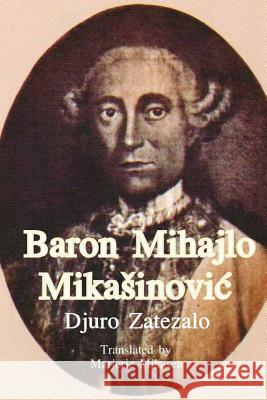Baron Mihajlo Mikasinovic » książka
Baron Mihajlo Mikasinovic
ISBN-13: 9780615973432 / Angielski / Miękka / 2014 / 144 str.
A biography of Baron Mihajlo Mikasinovic, a general of Serbian origin in the Austrian Army, provides an insight into the context of the mid-eighteenth century lives of Serbs on the Military Frontier ("Vojna Krajina") of Austro-Hungary and the many-sided aspects of their struggle. The key dimension of this struggle is found in the role of ethnic Serb officers in the military organization and campaigns of this part of the Austro-Hungarian empire. -Branko Mikasinovich **** Those who review books, and those who write them, know - or hope in their core - that books can change lives, change entire societies; change worlds. Anyone who covered the decade of conflict in the Balkans in the 1990s, and saw the dismemberment of Yugoslavia and its peoples, knew that the conduct and outcomes of the wars could have - would have - been different ... if only the right people in politics and the media in Europe and North America had read their history. .......... The brief and wonderfully readable Baron Mihajlo Mikasinovic by Croatian-born Serb Djuro Zatezalo is one such book which could have helped create more rational and understanding sentiments toward the various peoples of what was to become Yugoslavia. It may seem arcane to suggest that a biography of an 18th Century nobleman, fighting on the marches of the Austro-Hungarian Empire, could have changed 20th Century policy. But so it could. Indeed, the truly noble Baron left a legacy thrusting into the 21st Century for that same area where he was born and became a heroic, inspiring figure. .......... The book on Baron Mihajlo Mikasinovic shows clearly the underlying strand of history which destroyed the career of the Baron - to the detriment of the Empire - and also was later to lead to the war in Yugoslavia and cause a modern Croatia to be born in the ignominy of Ustase misdeeds instead of in the natural flowering of independence. Today's Croatia is attempting to re-balance the society away from the extremists, and the fact that Croatian-born Serb Djuro Zatezalo was able to remain in that territory and write his brief biography of the Baron is testimony to the return of moderation to Zagreb. The book begins with a preface entitled "Perseverence in the Orthodox Faith," by Serbian Orthodox Bishop Gerasim of the Upper Karlovac Diocese, and starts: The Military Border era the "marches"; hence the origin of the noble quasi-military rank of marquess - Ed.] is an important chapter in the history of the Habsburg monarchy. The Krajina region of Croatia] played a role in defending the Austro-Hungarian] state's borders from the beginning of the 16th to the end of the 17th century. The Krajina continued to have a stake in the Austrian wars in the Balkans and in Central and Western Europe in the 18th and 19th centuries. The name of Mikasinovic was to live on, not only in the residents of at least three hamlets (as the author notes) in Donje and Gornje Dubrave areas, but in a subsequent Lt.-Gen. Mikasinovic of the communist Yugoslav People's Army. And in Branko Mikasinovich, now living in the United States and determined to bring Djuro Zatezalo's book into an English-speaking world. Branko Mikasinovich worked not only to edit the sensitive translation by Marjorie Mikasen, but also to actually research and bring out the appropriate meanings of the various Austrian ranks and military terms of the period. This is an easily-digestible book which reaches any reader who recognizes that, in the prosecution of the wars of the 1990s in the Balkans (and, even, in World War II), there was something missing from the international communities' understanding of the complexities of the area and its people. It is not yet over: the transforming Greater Black Sea region, and the unrest within Turkey (and its present leader's anti-Ataturk dream of a new Ottomanism), make the Balkans, and therefore Europe, still vulnerable. So, even now, Zatezalo's book may find its mark in open minds. - Gregory











